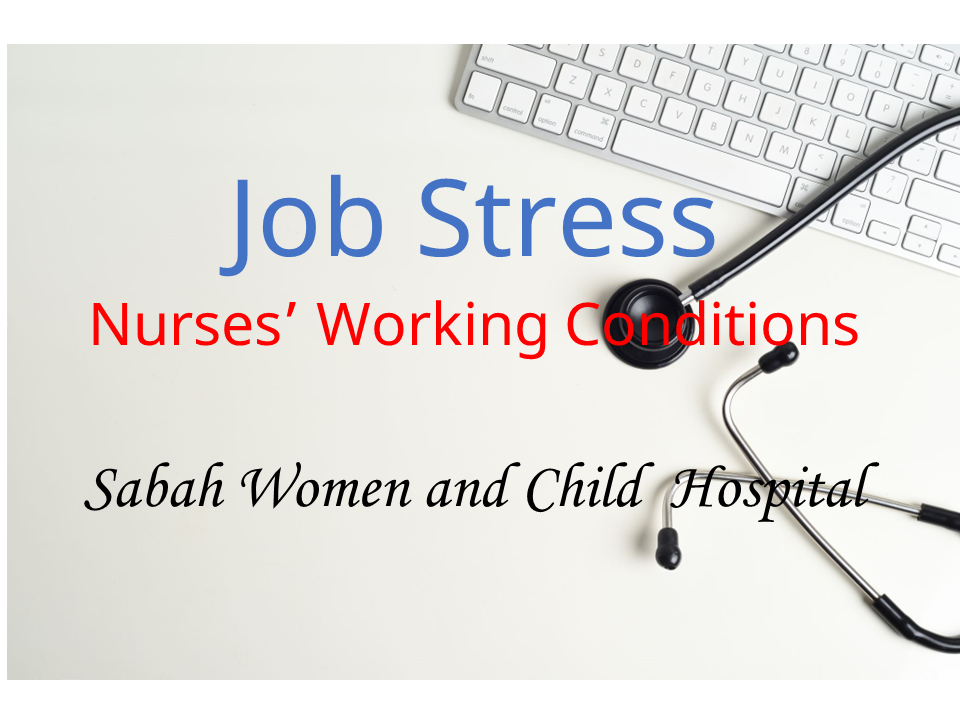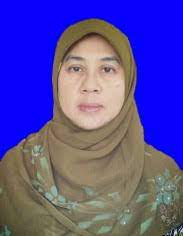Job Stress from Nurses’ Working Conditions in Sabah Women and Child Hospital
DOI:
https://doi.org/10.23917/bik.v17i2.3309Keywords:
gender, stress, nurse, working condition, relationshipAbstract
Both excessive and insufficient workloads can cause stress among employees. It has been established that as tasks take longer to complete, employee happiness tends to decrease, which can significantly impact their overall health and mental well-being. The primary objective of this study is to examine the relationship between age and working conditions concerning job stress among registered nurses in a government hospital in Sabah. The quantitative survey approach was employed, involving 60 registered nurses with a minimum of 3 years of experience. Purposive sampling was utilized to ensure a sample that would provide comprehensive insights and discoveries into the factors influencing job stress among nurses in this specific setting. The analysis indicated that there was no statistically significant relationship between age, working conditions as demographics, and job stress (p = 0.499). The average stress level reported by respondents was 15.7 ± 2.32379 on a scale where higher scores indicate greater stress. This finding suggests that the observed demographic characteristics, including age and specific working conditions, did not correlate with higher or lower levels of job stress among the nurses surveyed. Based on the survey results, it can be concluded that age and the specific working conditions studied do not appear to significantly influence the experience of job stress among registered nurses at the government hospital in Sabah. This implies that other factors not explored in this study may have a more pronounced impact on job stress levels within this population. Future research could explore additional variables or consider different methodologies to further understand the complexities of job stress among healthcare professionals.
Downloads
References
Aghilinejad, M., Mohammadi, S., Afkari, M., & Abbaszade Dizaji, R. (2007). Surveying the association between occupational stress and mental health, personality, and life stressful events in Tehran police officers. Research in Medicine, 31(4), 355–360. http://pejouhesh.sbmu.ac.ir/browse.php?a_code=A-10-1-388&slc_lang=en&sid=1&sw=Consultation
Arbabisarjou, A., Ghoreishinia, G., Zare, S., Chalileh, J., & Shahrakipour, M. (2017). Study of Job Stress among Nurses Working in Teaching Hospitals. Der Pharmacia Lettre, 9(1), 37–42.
Bauldoff, G., Gubrud, P., & Carno, M. (2020). Medical-Surgical Nursing: Clinical Reasoning in Patient Care (7th ed.). Pearson. https://www.pearson.com/us/higher- education/program/Bauldoff-Le-Mone-and-Burke-s-Medical-Surgical-Nursing-Clinical-Reasoning-in-Patient-Care-7th-Edition/PGM1869530.html
Bhanu, M. V. V, & Babu, P. C. S. (2018). Impact of Work Environment and Job Stress towards Job Satisfaction. IOSR Journal of Business and Management, 20(2), 1–7.https://doi.org/10.9790/487X-2002020107
Company, T. (2015). Ethical considerations in research Ethical considerations. Canadian Journal of Hospital Pharmacy, 23(1), 3–5. https://doi.org/10.1242/dev.119024
Creswell, J. W. (2015). Research design: qualitative, quantitative, and mixed methods approaches (4th ed.). SAGE Publications. https://books.google.co.id/books/about/Research_Design.html?id=s4ViswEACAAJ&redir_esc=y
Curtis, K., Fry, M., Shaban, R. Z., & Considine, J. (2017). Translating research findings to clinical nursing practice. Journal of Clinical Nursing, 26(5–6), 862–872. https://doi.org/10.1111/jocn.13586
Dagget, T., Molla, A., & Belachew, T. (2016). Job-related stress among nurses working in Jimma Zone public hospitals, Southwest Ethiopia: a cross-sectional study. BMC Nursing, 15(1), 39. https://doi.org/10.1186/s12912-016-0158-2
Dahlgren Memorial Library. (2017). Guide: Clinical Questions, PICO, and Study Designs. Guides: Evidence-BasedMedicineResource. http://guides.dml.georgetown.edu/ebm/ebmclinicalquestions
Dewanto, A. (2018). Work Stress Among Nurses in a Private Hospital in Lumajang Indonesia. KnE Life Sciences, 4(9), 172. https://doi.org/10.18502/kls.v4i9.3569
de Kerguenec Y. (2017). Le Code de déontologie des infirmiers, historique et perspectives [The code of ethics for nurses, history and perspectives]. Soins; la revue de reference infirmiere, 62(818), 33–36. https://doi.org/10.1016/j.soin.2017.06.013
Dowden, C., & Tellier, C. (2004). Predicting work-related stress in correctional officers: A meta-analysis. Journal of Criminal Justice, 32(1), 31–47. https://doi.org/10.1016/j.jcrimjus.2003.10.003
Gray, J. (2017). Collecting and managing data. In Burn’s and Grove’s, The Practice of Nursing Research. ELSEVIER - HEALTH Science.
Gray, J., & Grove, S. (2020). BURNS AND GROVE’S THE PRACTICE OF NURSING RESEARCH: appraisal, synthesis, and generation of evidence. (9th ed.). ELSEVIER - HEALTH Science.
Gray, J., Grove, S., & Sutherland, S. (2016). Burns and Grove’s The Practice of Nursing Research - 8th Edition (Saunders (ed.); 8th ed.). https://www.elsevier.com/books/burns-and-groves-the-practice-of-nursing- research/gray/978-0-323-37758-4
Heale, R., & Shorten, A. (2017). Ethical context of nursing research. Evidence-Based Nursing, 20(1), 7–8. https://doi.org/10.1136/eb-2016-102514
Ismail, A. (2018). How Malaysian science can improve lives as well as the economy. Nature, 558(7711), 514–515. https://doi.org/10.1038/d41586-018-05509-y
Justine, N., Justine, F., Gani, E. D., Stephen, G., Sebastian, B. H., Sansuito, T., & Dioso, R.-. (2018). Work-Related Stress among Staff Nurses at a Private Hospital in Singapore. Arch Emerg Med Intensive Care, 1(1), 29–33.
LeMone, P., & Burke, K. (2015). Medical-Surgical Nursing: Clinical Reasoning in Patient Care (G. Bauldoff & P. Gubrud (eds.); 6th ed.). Pearson. https://www.pearson.com/us/higher-education/product/Le-Mone-Medical-Surgical- Nursing-Clinical-Reasoning-in-Patient-Care-6th-Edition/9780133139433.html
Leng, M., Wei, L., Shi, X., Cao, G., Wei, Y., Xu, H., Zhang, X., Zhang, W., Xing, S., & Wei, H. (2021). Mental distress and influencing factors in nurses caring for patients with COVID‐19. Nursing in Critical Care, 26(2), 94–101. https://doi.org/10.1111/nicc.12528
Mokdad, A. H., Forouzanfar, M. H., Daoud, F., El Bcheraoui, C., Moradi-Lakeh, M., Khalil, I., Afshin, A., Tuffaha, M., Charara, R., Barber, R. M., Wagner, J., Cercy, K., Kravitz, H., Coates, M. M., Robinson, M., Estep, K., Steiner, C., Jaber, S., Mokdad, A. A., … Murray, C. J. L. (2016). Health in times of uncertainty in the eastern Mediterranean region, 1990–2013: a systematic analysis for the Global Burden of Disease Study 2013. The Lancet Global Health, 4(10), e704–e713. https://doi.org/10.1016/S2214-109X(16)30168-1
M.M. Zafir and M.H. Fazilah Malaysian Journal of Community Health (2016) Pusat Pengajian Pengurusan Perniagaan, Fakulti Ekonomi Dan Perniagaan, Universiti Kebangsaan Malaysia.
Mu'taman Jarrar, Noorhaliza Ali, Rashidah Shahruddin, and Khalid Al Mugheed (2023) The Impact of the Working Hours Among Malaysian Nurses on Their Ill-Being, Intention to Leave, and the Perceived Quality of Care: A Cross-Sectional Study During the COVID-19 Pandemic DOI:10.2147/JMDH.S394583
National Institute for Occupational Safety and Health. (1999). Preventing needlestick injuries in health care settings. Alert NIOSH.
Nourian, M., Askari, G., Golshiri, P., Miraghajani, M., Shokri, S., & Arab, A. (2020). Effect of Lifestyle Modification Education based on the health belief model in overweight/obese patients with non-alcoholic fatty liver disease: A parallel randomized controlled clinical trial. Clinical Nutrition ESPEN, 36(1), 100–120. https://doi.org/10.1016/j.clnesp.2020.04.004
Parahoo, K. (2014). Nursing research principles, process, and issues (3rd ed.). Palgrave Macmillan.
Poh, B. K., Lee, S. T., Yeo, G. S., Tang, K. C., Noor Afifah, A. R., Siti Hanisa, A., Parikh, P., Wong, J. E., & Ng, A. L. O. (2019). Low socioeconomic status and severe obesity are linked to poor cognitive performance in Malaysian children. BMC Public Health, 19(S4), 541–545. https://doi.org/10.1186/s12889-019-6856-4
Polit, D. F., & Beck, C. T. (2017). Nursing Research Generating and Assessing Evidence for Nursing Practice (10th ed.). Wolters Kluwer Health. https://www.scirp.org/(S(lz5mqp453edsnp55rrgjct55))/reference/ReferencesPapers. aspx?ReferenceID=2325091
Price, S., Aston, M., Monaghan, J., Sim, M., Tomblin Murphy, G., Etowa, J., Pickles, M., Hunter, A., & Little, V. (2018). Maternal Knowing and Social Networks: Understanding First-Time Mothers’ Search for Information and Support Through Online and Offline Social Networks. Qualitative Health Research, 28(10), 1552– 1563. https://doi.org/10.1177/1049732317748314
Rice, V. H. (2000). Theories of stress and relationship to health. In V. H. Rice (Ed.), Handbook of stress, coping, and health: Implication for nursing. Research, theory, and practice. (1st ed.). Sage Publications.
Salilih, S. Z., & Abajobir, A. A. (2014). Work-related stress and associated factors among nurses working in public hospitals of Addis Ababa, Ethiopia: a cross-sectional study. Workplace health & safety, 62(8), 326–332. https://doi.org/10.1177/216507991406200803
Savage, B. M., Lujan, H. L., Thipparthi, R. R., & DiCarlo, S. E. (2017). Humor, laughter, learning, and health! A brief review. Advances in Physiology Education, 41(3), 341– 347. https://doi.org/10.1152/advan.00030.2017
Schardt, C., Adams, M. B., Owens, T., Keitz, S., & Fontelo, P. (2017). BMC Medical Informatics and Decision-Making Utilization of the PICO framework to improve searching PubMed for clinical questions. BMC Medical Informatics and Decision Making, 7(16), 1–6. https://doi.org/10.1186/1472-6947-7-16
Selcuk, A. A. (2019). A Guide for Systematic Reviews: PRISMA. Turkish Archives of Otorhinolaryngology, 57(1), 57–58. https://doi.org/10.5152/tao.2019.4058
Shakir Aizat Shahruddin, Pratheeksha Saseedaran, Aishah Dato Salleh, Che Amira Ahmad Azmi, Nik Harriz Izwan Mohammad Alfaisal, Maher D Fuad Fuad, Balsam Mahdi Nasir Al-Zurfi, Mohd Rusli Abdullah (2016): Prevalence and Risk Factors of Stress, Anxiety and Depression among House Officers in Kota Kinabalu, Sabah Volume 8 Issue 1 2016 DOI: 10.5959/eimj. v8i1.398
Stocchetti, N., Segre, G., Zanier, E. R., Zanetti, M., Campi, R., Scarpellini, F., Clavenna, A., & Bonati, M. (2021). Burnout in Intensive Care Unit Workers during the Second Wave of the COVID-19 Pandemic: A Single Center Cross-Sectional Italian Study. International Journal of Environmental Research and Public Health, 18(11), 6102. https://doi.org/10.3390/ijerph18116102
Sutherland, V. J., & Cooper, C. L. (2000). Strategic stress management: An organizational approach (1st ed.). Macmillan Business.
Wang, Q., Lv, W., Qian, R., & Zhang, Y. (2019). Job burnout and quality of working life among Chinese nurses: A cross‐sectional study. Journal of Nursing Management, 27(8), 1835–1844.

Submitted
Accepted
Published
How to Cite
Issue
Section
License
Copyright (c) 2024 Clarice Duasin, Baidi Baddiri, Rohani Mamat, Mazlinda Musa, Caroline Satu, Siti Fatimah Saat

This work is licensed under a Creative Commons Attribution 4.0 International License.


















